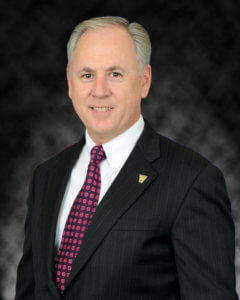And Now a Word With … Bob Woods
By Dan Gephart, May 20, 2020

We are thrilled to announce the newest addition to our FELTG Faculty – Bob Woods (pictured at right). As a former federal conference program chair, I had the opportunity to work with Bob in recent years. He’s smart, engaging, approachable, and cares about the federal workforce. In other words, he fits right in with the rest of FELTG’s instructors.
If you have seen Bob present or if you’ve worked for the Department of the Navy, then you already know this about Bob. If not, you’ll get to see and hear him in action soon. Bob will be one of the presenters during the FELTG Virtual Training Institute’s Taking Defensible Disciplinary Actions on June 1-3, 2020 and EEOC Law Week August 10-14, 2020.
Most recently Bob served as the Principal Deputy Assistant Secretary (Manpower and Reserve Affairs) for the Department of the Navy. He was the principal advisor to the Assistant Secretary in executing responsibilities for the overall supervision and oversight of manpower and reserve component affairs of the Navy, including the development of programs and policy related to military personnel (active, reserve, retired), their family members, and the civilian workforce; the tracking of the contractor workforce; and, the oversight of Human Resources systems within the Department.
Previously, Bob served as Assistant General Counsel (M&RA) where he was legal advisor to the Secretariat for matters concerning military and civilian personnel policy. He also coordinated the efforts of Navy attorneys worldwide in administrative and federal court employment litigation. He was appointed Special Counsel Litigation where he was responsible for the most important litigation matters under the cognizance of the General Counsel. His pre-Navy career included stints with the General Services Administration and the Department of Commerce, where he handled labor and employment litigation.
Bob retired from the U.S. Air Force in 1998 after more than 20 years of active duty.
We had to put an end to the FELTG Faculty initiation process a few years ago, so instead, we’re submitting Bob to an And Now a Word With … interview.
DG: What’s the best advice you’ve received that had the most impact on your federal career?
BW: I’d have to say that in addition to “follow the golden rule,” the best advice I received was the tried and true (for the most part) “bloom where you’re planted.” About 98 percent of the time, I was “planted” in places where I could bloom and thrive. In those cases, I found that putting in the work and being a generally cheerful and helpful colleague enabled me to be recognized for my potential and helped me get the assignments and jobs that I wanted and that helped me progress. I learned that I was/am responsible for myself and that I can choose to be sunny (or gloomy). Learn your craft, be inclusive, take on the tough assignments, be timely, be collegial and you’re likely to be successful. In those very few cases where I was “planted” in less than “fertile soil,” I made an effort to improve the conditions by doing those things (hard work, cheerful colleague, etc.) that helped me thrive. Sometimes however, no matter what you do, you can’t fix toxic conditions and you have to find a way to move on.
DG: What’s the federal employment law-related myth that you think is most prevalent government-wide?
BW: I think the most prevalent federal employment law-related myth I’ve encountered is that you can’t fire a civilian. In my experience, many supervisors suffer poor-performing or toxic employees for far too long. These employees make up a very small fraction of the civilian workforce, but account for a disproportionate amount of grief. In my opinion, the tools available to deal with poor performers are sadly underutilized, despite the fact that they are fairly straight forward and relatively easy to use.
DG: How can that be fixed?
BW: This is clearly a leadership issue. Some supervisors would rather put up with the poor performer than use these tools. This is probably because they either don’t understand how to use these tools or they’re afraid of having to defend against the employee’s complaint or appeal (or a combination of the two). To fix this problem, supervisors need to be taught how to use the tools, provided good support from their leaders, HR and Legal teams, and held accountable themselves by their supervisors to do the right thing.
DG: What’s your favorite part of teaching/presenting?
BW: I enjoy the fact that I’m able to share what I know with the audience and I enjoy interacting with them. Federal employment law can be a complicated topic and I enjoy breaking it down for folks to be able to better understand and use these tools.
